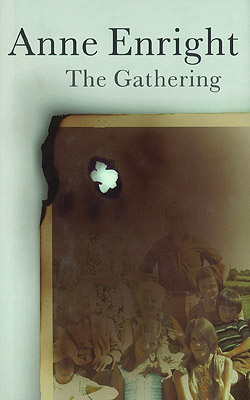Anne Enright: The Gathering

The protagonist and narrator of the novel is Veronica Hegarty, one of the several children of the Hegarty clan. The story starts off with Veronica’s brother, Liam committing suicide. After the death of Liam, the family – whose remaining members now live all over the world – needs to be brought together for the wake. The responsibility falls to Veronica since she was the closest to Liam. So she informs their mother about Liam’s death, travels to England to organize the transportation of Liam’s body and deal with all the paperwork, in one word, she arranges everything that needs to be arranged, so that in the end, every family member can properly mourn for Liam in their old home, and then everybody can go home and get on with their lives. Everybody except Veronica, who cannot deal with the tragedy in an easy way.
I won’t go into more details because the novel doesn’t have a story proper. This novel is about the period when Veronica slowly and more or less sufficiently comes to terms with the fact that her brother is dead and regains her ability to live a more or less normal life again. During these months Veronica falls out of time and the everyday course of events, her whole being is filled up with her loss and all she is able to do is to think about her past and her family, while neglecting her husband and children. She thinks (and talks) about her relationship with her brother; about the history of the Hegarty family, starting from her grandparents’ generation; and about that traumatic event which happened at their grandparents’ place when she was eight and Liam was nine, and which forever changed the course of Liam’s life.
Besides Veronica’s mourning, the novel is also about the processing and rewriting of the past and about the question whether it’s possible at all to rewrite one’s memories. Just to name a few of the rewriting-revisiting methods: Veronica recalls everything she knows about her family and keeps coming up with alternative family (hi)stories which could easily have been true (e.g. there’s a scene right at the beginning of the book, full of suppressed sexuality, which tells the story of the first meeting of Veronica’s grandparents – then it turns out that in fact the male protagonist of the scene wasn’t Veronica’s grandfather but someone else). Veronica also visits the places which were significant in her life for one reason or the other, and she hopes that by these visits she will be able to recall, relive and then perhaps finally forget certain events of her past. And she also tries to explain why the lives of her family members took certain turns (however, the explanations keep changing: at one point Veronica names a specific event which ruined Liam’s life forever, but later on she says that Liam would have ended up living the same screwed-up life, even if that particular traumatic event had never happened.)
Anne Enright writes about the way memory works, emotions change and thoughts race in one’s head in an authentic (and authentically frustrating) way. Veronica’s thoughts are often conveyed in a stream-of-consciousness fashion, with random associations and ideas piling up on one another, so with some exaggeration I can almost say that in one paragraph we are reading about the organization of Liam’s wake, in the next we are reading about the American boy who used to be Veronica’s lover at the university, and in the next we are reading about the summer when her grandmother took her, Liam and another one of their sisters to the sea. Despite all this, the novel is not impossible to follow – only, it requires more attention than an „average” book. Not only because it’s often not obvious which year we are in and whom we are talking about, but also because we can never know for sure about any particular detail whether Veronica is telling the truth or she’s again rewriting and reinterpreting her memories and trying to fictionalize reality.
I assume anyone who read more than two posts on this blog is well aware that I’m deeply interested in the themes this novel is about. And Anne Enright writes about all of them well.
I won’t go into more details because the novel doesn’t have a story proper. This novel is about the period when Veronica slowly and more or less sufficiently comes to terms with the fact that her brother is dead and regains her ability to live a more or less normal life again. During these months Veronica falls out of time and the everyday course of events, her whole being is filled up with her loss and all she is able to do is to think about her past and her family, while neglecting her husband and children. She thinks (and talks) about her relationship with her brother; about the history of the Hegarty family, starting from her grandparents’ generation; and about that traumatic event which happened at their grandparents’ place when she was eight and Liam was nine, and which forever changed the course of Liam’s life.
Besides Veronica’s mourning, the novel is also about the processing and rewriting of the past and about the question whether it’s possible at all to rewrite one’s memories. Just to name a few of the rewriting-revisiting methods: Veronica recalls everything she knows about her family and keeps coming up with alternative family (hi)stories which could easily have been true (e.g. there’s a scene right at the beginning of the book, full of suppressed sexuality, which tells the story of the first meeting of Veronica’s grandparents – then it turns out that in fact the male protagonist of the scene wasn’t Veronica’s grandfather but someone else). Veronica also visits the places which were significant in her life for one reason or the other, and she hopes that by these visits she will be able to recall, relive and then perhaps finally forget certain events of her past. And she also tries to explain why the lives of her family members took certain turns (however, the explanations keep changing: at one point Veronica names a specific event which ruined Liam’s life forever, but later on she says that Liam would have ended up living the same screwed-up life, even if that particular traumatic event had never happened.)
Anne Enright writes about the way memory works, emotions change and thoughts race in one’s head in an authentic (and authentically frustrating) way. Veronica’s thoughts are often conveyed in a stream-of-consciousness fashion, with random associations and ideas piling up on one another, so with some exaggeration I can almost say that in one paragraph we are reading about the organization of Liam’s wake, in the next we are reading about the American boy who used to be Veronica’s lover at the university, and in the next we are reading about the summer when her grandmother took her, Liam and another one of their sisters to the sea. Despite all this, the novel is not impossible to follow – only, it requires more attention than an „average” book. Not only because it’s often not obvious which year we are in and whom we are talking about, but also because we can never know for sure about any particular detail whether Veronica is telling the truth or she’s again rewriting and reinterpreting her memories and trying to fictionalize reality.
I assume anyone who read more than two posts on this blog is well aware that I’m deeply interested in the themes this novel is about. And Anne Enright writes about all of them well.





